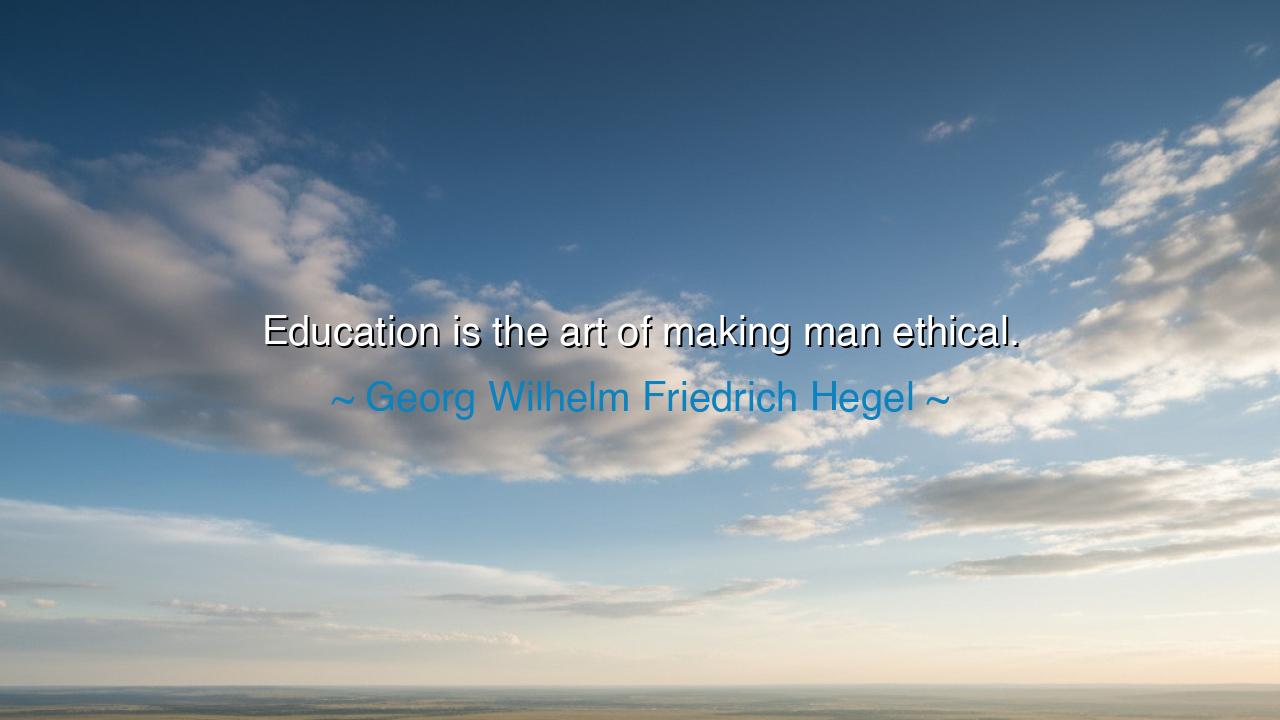
Education is the art of making man ethical.






“Education is the art of making man ethical.” Thus spoke Georg Wilhelm Friedrich Hegel, the great German philosopher whose mind reached into the very structure of human reason and society. His words, though born in the halls of philosophy, carry the weight of timeless truth—that the true purpose of education is not merely to fill the mind with knowledge, but to shape the soul toward goodness. Education, in Hegel’s vision, is not a mechanical process but a sacred art, a deliberate act of cultivation by which a human being learns to live not for himself alone, but in harmony with truth, justice, and humanity.
To call education an art is to recognize its divine delicacy. The artist takes raw material—stone, canvas, clay—and breathes form into it. So too does education take the raw human spirit, full of impulse and potential, and refine it through discipline, reflection, and understanding. Yet Hegel reminds us that this shaping must not stop at intellect alone; it must reach the moral core of man. For to educate the mind without touching the conscience is to raise a clever devil rather than a wise soul. True education, therefore, must awaken within man an awareness of duty, compassion, and respect for the laws that bind all beings in shared existence.
Hegel lived in an age when Europe was trembling with revolution—an age of rising individualism and the struggle for freedom. He saw that freedom without morality could become chaos, and knowledge without ethics could destroy rather than uplift. Thus, he taught that the highest form of education is the making of man ethical—that is, the integration of wisdom with virtue, intellect with conscience. To be educated, in the Hegelian sense, is to understand one’s role within the great moral order—to live not as an isolated creature, but as part of the ethical whole of society.
We see this truth reflected in the life of Mahatma Gandhi, who was deeply influenced by moral philosophy though not formally schooled in Hegel’s works. Gandhi’s education did not end with books; it began when he applied moral principles to life. Through his studies of law and his experiences of injustice in South Africa, he transformed mere knowledge into ethical conviction. He discovered that education without morality is hollow, and that the greatest learning is that which teaches man to serve truth, compassion, and justice. His education in ethics led him to awaken millions—not through force, but through moral example. Gandhi’s life stands as living proof of Hegel’s wisdom: that the highest purpose of learning is to make man ethical, to shape him into one who acts rightly even when no one watches.
To make man ethical, education must teach him to see beyond himself. It must awaken his sense of responsibility to others—to the family, the community, the nation, and all humanity. It must teach him that freedom is not license, but discipline guided by conscience. For what is the use of a sharp mind without a noble heart? A society rich in knowledge but poor in virtue destroys itself from within. The true measure of education, therefore, is not in degrees or wealth, but in the character it produces. The educated man is not the one who knows the most, but the one who does the most good.
Yet this path is not easy, for the making of an ethical man requires both teacher and student to labor in patience and humility. The teacher must be an artist of the spirit, shaping not with force, but with example. He must draw out the good that lies dormant in every soul, much like a sculptor reveals the hidden form within the marble. The student, too, must yield to the discipline of learning—not merely memorizing truths, but embodying them. When education becomes such a partnership of truth and virtue, society itself becomes an ethical community, and civilization rises.
Therefore, O seeker of wisdom, remember this: education is sacred work. Its purpose is not to build towers of intellect, but temples of virtue. Let your learning refine your heart as much as your mind. Study deeply, but live rightly. Let every lesson draw you closer to justice, compassion, and truth. Do not pursue knowledge for power, but for the service of mankind. For the world does not need more learned men—it needs more ethical ones.
The lesson is clear: the highest goal of education is not mastery of knowledge, but mastery of self. As Hegel taught, to educate is to transform; to learn is to become good. So seek not only to know, but to understand; not only to achieve, but to act with conscience. For in the union of intellect and virtue lies the perfection of man, and in that union shines the eternal purpose of all true education—the art of making man ethical.






AAdministratorAdministrator
Welcome, honored guests. Please leave a comment, we will respond soon